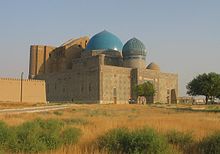Ahmed Yesevi

Chodscha Ahmed Yesevi ( Kazakh Ахмет Ясауи Akhmet Jasawi , Uzbek Аҳмад Ясавий Ahmad Yasaviy , Turkmen Ахмет Ясавы Ahmet Ýasawy , Arabic خوجة أحمد يسوي, DMG Ḫūǧa Aḥmad Yasawī , Persian خواجه احمد یسوی, DMG Ḫ w āǧa Aḥmad-i Yasawī ; * 1103 in Sayram ; † 1166 in Yasi in today's Kazakhstan ) was an important representative of Sufism ( Islamic mysticism ) and poet . The Yesevi-Tariqa goes back to him . In 2003, a collection of documents was Khoja Ahmed Yasavi by the UNESCO for World Soundtrack Awards explained.
Life
Ahmed Yesevi was a descendant of Muhammad ibn al-Hanafīya , a son of the fourth caliph Ali , cousin and son-in-law of the Prophet Muhammad . His father, Sheikh Ibrahim, died when he was a young boy and his family moved to the city of Yasi (now the Kazakh city of Turkistan ). There he became a student of Arslan Baba , a well-known Murschid (Sufi teacher) in the region. After his death, Ahmed Yesevi went to Bukhara to continue his studies there, and became a student of Yusuf Hamadhani († 1140).
Later, after Hamadhani passed away and Ahmed Yesevi had stayed in Bukhara for a while, he went back to Yasi and helped that place become a teaching center in the Kazakh steppe. At the age of 63 he retired from public life, whereupon he dug an underground hermit cell , in which he is said to have spent the rest of his life.
His mausoleum was built by order of the Timurid ruler Timur between 1389 and 1405.
The Ahmed Yesevi University in Kazakhstan is named after him.
Individual evidence
- ^ Collection of the manuscripts of Khoja Ahmed Yasawi. UNESCO - Memory of the World, 2003, accessed July 13, 2014 .
- ^ YN Öztürk: The Eye of the Heart (Redhouse Press Istanbul 1988), p. 49.
| personal data | |
|---|---|
| SURNAME | Yesevi, Ahmed |
| ALTERNATIVE NAMES | Yasawi, Ahmad |
| BRIEF DESCRIPTION | Sufi |
| DATE OF BIRTH | 1103 |
| PLACE OF BIRTH | Sayram |
| DATE OF DEATH | 1166 |
| Place of death | Yasi |